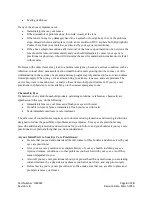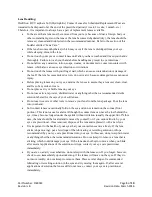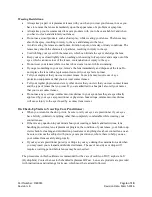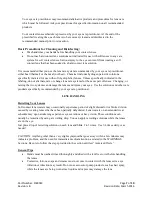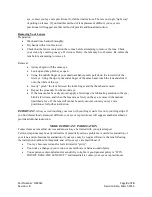
Part Number: PIB0013
Page
2
of
10
Revision: B
Revision Date: March 2016
settled. Take care in handling your lenses. Always avoid touching your lenses with your fingernails
or other sharp objects.
Soft contact lenses including ocufilcon D UV asphere Soft (Hydrophilic) Contact Lenses are made of
a type of plastic that absorbs liquids and vapors. As such they may collect both extraneous and
naturally occurring deposits.
Therefore, if the lens needs to be removed before the prescribed wearing time has elapsed, you must
follow the sections in the booklet entitled, “Lens Care and Lens Handling” as well as the written
instructions on the recommended care products. Damaged lenses can lead to serious eye infections
and discomfort.
If any problems do occur, remove your lenses and visit you eye care practitioner.
Ocufilcon D UV asphere Soft (Hydrophilic) Contact Lenses in a scheduled replacement program
were designed to provide comfortable vision. Proper care and adherence to instructions should
enable you to feel good and see clearly.
The ocufilcon D UV asphere Soft (Hydrophilic) Contact Lenses are indicated for the correction of
visual acuity in persons with not-aphakic, non-diseased eyes which manifest myopia
(nearsightedness), hyperopia (farsightedness) and astigmatism lower than -2.00 diopters that does not
interfere with visual acuity.
The ocufilcon D UV asphere Soft (Hydrophilic) Contact Lenses may be prescribed for daily wear or
extended wear. The eye care practitioner may prescribe the ocufilcon D UV asphere Soft
(Hydrophilic) Contact Lenses for single use disposable wear or for scheduled replacement wear, with
cleaning, disinfection, and scheduled replacement (see Patient Information Booklet for the Scheduled
Replacement Program). When prescribed for scheduled replacements the lens may be disinfected
using a chemical (no heat) or hydrogen peroxide disinfecting systems.
The ocufilcon D UV asphere Soft (Hydrophilic) Contact Lenses help protect against transmission of
harmful UV radiation to the cornea and into the eye.
WARNINGS AND ADVERSE EFFECTS
WARNINGS
Prior to purchasing contact lenses, you should discuss fully with your practitioner the effect of
contact lenses on your eyes, and all risks associated with contact lens wear, in addition to receiving a
thorough eye examination. While the great majority of people successfully wear contact lenses
without problems, a small percentage of wearers have experienced adverse effects with contact lens
wear and usage of lens care solutions, resulting in serious eye problems such as infections, ulcers,
and other damage to the cornea (the front layer of the eye). In some cases, these problems can lead to
serious eye injury and loss of vision, particularly if prompt and effective medical treatment is not
obtained. Additionally, smoking increases the risk of ulcerative keratitis for contact lens users.




